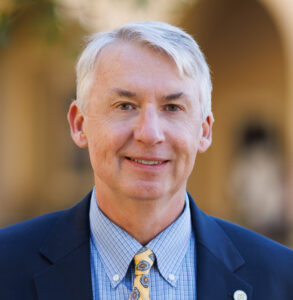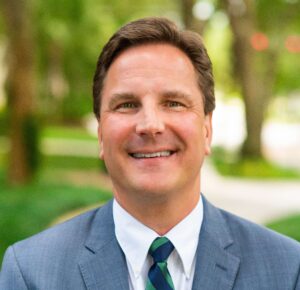Writer: Alejandro Sanchez
2 min read April 2022 — As Central Florida’s economy continues to grow, leaders in higher education are working to ensure that students are prepared for an ever-evolving business environment. The end goal is to consolidate affordable, market-driven programs that equip students with the necessary skills to thrive. Grant Cornwell, president at Rollins College, and Christopher Roellke, president at Stetson University shared their thoughts with Invest: on how higher education is adjusting to a changing economy and the actionable steps their universities are taking to adapt.
What actions is your institution taking to address education affordability?
 Grant Cornwell: Affordability is a big issue because a higher education degree is a very significant investment, especially if you go to some of the more rigorous or elite institutions. Further, time and again it is demonstrated that the investment in higher education has tremendous, life-long returns.
Grant Cornwell: Affordability is a big issue because a higher education degree is a very significant investment, especially if you go to some of the more rigorous or elite institutions. Further, time and again it is demonstrated that the investment in higher education has tremendous, life-long returns.
At Rollins, we want to make sure that we use financial aid to enable every student who’s qualified and wants to study at Rollins to be able to study at Rollins. In our CLA program, 95% of our students receive financial aid, and the average cost of attendance is half the full published price. We extend a tremendous amount of financial aid. We also know that to be relevant and have an excellent educational institution, we need to be a diverse institution. The real learning that takes place needs voices from all kinds of backgrounds, experiences, and identities — ethnic, racial, national, socioeconomic, gender. We need that diversity in the mix. But to have a diverse student body we need to extend the financial aid necessary to be able to empower those families from underserved backgrounds to be able to have access to high-quality education. That’s a big priority for us.
 Christopher Roellke: With a student-to-faculty ratio of 12-to-1, it is a very intimate academic environment. Although our “sticker price” is a bit more expensive, we distribute $98 million on average in financial aid each year to make this powerful form of education both affordable and accessible for the dramatically changing demographics in our region, in the United States and around the world.
Christopher Roellke: With a student-to-faculty ratio of 12-to-1, it is a very intimate academic environment. Although our “sticker price” is a bit more expensive, we distribute $98 million on average in financial aid each year to make this powerful form of education both affordable and accessible for the dramatically changing demographics in our region, in the United States and around the world.
Our focus is to make this platform of education accessible, affordable and achievable for the wide range of students coming to us.
We are very generous about financial aid. We also work to ensure that the instruction we deliver is done while expenses are manageable. The challenge is how to best deliver content and experiences in a manner that is both attainable and transformative for students. The allocation of faculty time is the most important element as two-thirds of our budget is devoted to compensation and benefits for faculty. They are our single greatest investment and we need to nurture and manage this investment with care and insight.
How do you create and update your curriculum?
Cornwell: Every college and university with integrity invests the faculty with authority over the curriculum. That’s the secret sauce of American higher education. It’s why we’re the best system that the world has ever seen. Faculty have academic freedom and we can trust them with creative oversight of the curriculum of what is taught and how it’s taught. We can ask challenging questions and we can bring resources to the table to invest in good ideas, but we empower the faculty to develop the educational design.
The other key issue is to have academic integrity. You must have academic integrity if you’re going to have real innovation in research, teaching and learning. The only way to have academic integrity is for there to be academic freedom. The last thing you want, the thing that would kill the quality of education in America, is if the curriculum were dictated from Tallahassee or Washington, D.C., because that means that what’s taught and how it’s taught is politicized and serves whatever political regime is in office now. When you go down that road, you no longer have anything resembling a truly American educational system.
Roellke: It is our faculty themselves that own the curriculum as they are the content experts in their fields. In addition, our faculty have academic freedom, a long-standing principle in American higher education. We engage our faculty, our students and our regional partners in implementing curricular innovations. No problem in society today is solved within a single discipline. We need to collaborate with the faculty, with industry leaders, researchers and practitioners. I think Stetson is well-situated to do precisely that; to make sure that the education we offer is relevant and can contribute meaningfully to the workforce.
In the case of a public health crisis like COVID-19, the collaboration must be with epidemiologists and public health officials; in the case of homelessness, we need to work with industry and housing and urban development. These kinds of collaborations must occur. That is how we foster curricular change and enables us to prepare students to lead society judiciously to good ends. We’re not doing that if the curriculum is irrelevant or outdated. It must be modern, pragmatic and powerful, so the students are equipped not only to tackle the problems of today but the problems of tomorrow.
Where is Rollins today and where do you see the biggest opportunities and challenges?
Cornwell: In our undergraduate College of Liberal Arts, we believe that this is a time to double down on our value proposition that the deepest and most rigorous learning happens in the context of in-person relationships, with students and faculty working together to advance knowledge and understanding. Our small classes and student-centered pedagogy mean that students are held accountable for learning in ways that simply doesn’t happen in large lectures and certainly does not happen online. We’re realizing that this value proposition still has strong market resonance. It is what our clientele wants out of a college education: academic rigor, engagement, and personal mentoring.
At the graduate level, Crummer Graduate School of Business is very important for the Central Florida economy. If you have a Crummer MBA, you have the best MBA you can have in Florida. In this climate, with our region searching for knowledge workers ready to step up in management, Crummer is the educational center of gravity.
Rollins also offers graduate and continuing education programs through the Hamilton Holt School. These programs are designed specifically for working adults to advance their education and careers and increase the value that they provide to Central Florida organizations. We will add programs that speak directly to where there are job opportunities for well-trained, well-educated knowledge workers with a college degree to take up that place in Orlando’s economy.
The strategies at all three educational entities are based on the same set of values, which is very personalized education with a student at the center and expert faculty mentoring each student to reach their fullest potential.
What is your outlook for Stetson university for the next two to three years?
Roellke: I am profoundly optimistic about our future. I do think it’s going to require us to think in non-traditional ways. I think it’s going to require us to not pretend we know all the answers, that some of the best answers and that promising ideas may be outside the academy. We will need to expand our demographic and include more adult and non-traditional learners. I am also very optimistic because we offer a transformational and special form of education that is in high demand, not only among students, but also among employers seeking top talent.
For more information, visit:

